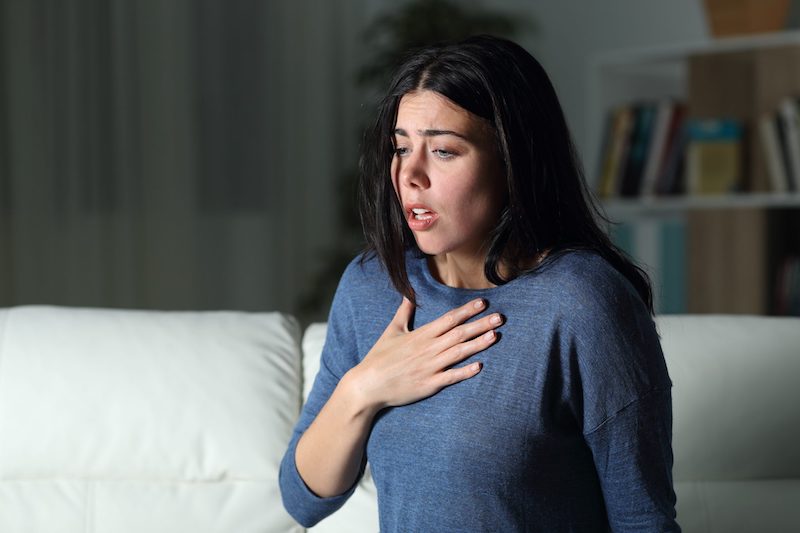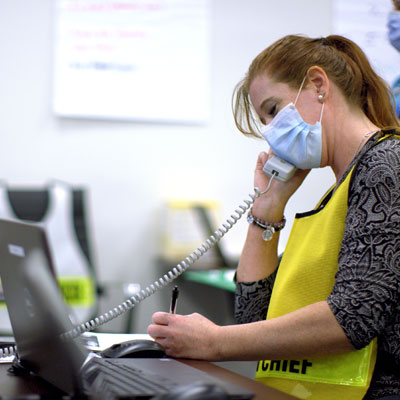Is My Shortness of Breath an Anxiety Attack or Coronavirus?

April 28, 2020
Information regarding COVID-19 and vaccines are continually evolving, new details may be available since this content was developed. Please visit the CDC's website for the most up to date information.
By: Larry Ginsberg
A common symptom associated with both COVID-19 and an anxiety attack (or panic attack disorder) is shortness of breath. What may have seemed like shortness of breath due to a mild anxiety attack three months ago may now be more concerning because of heightened fear related to COVID-19.
What’s the difference?
Shortness of breath from an anxiety or panic attack is different from symptoms related to COVID-19, in that it typically lasts from 10 to 30 minutes. These episodes or brief periods of shortness of breath are not accompanied by other symptoms and don’t continue over an extended period of time.
Shortness of breath related to COVID-19 lasts longer than a 10 to 30 minute period and might be accompanied by other symptoms, including:
- Fever (over 100)
- Dry cough
- Chest tightness
- Chills
- Repeated shaking with chills
- Muscle pain
- Headache
- Sore throat
- New loss of taste or smell
According to Magdalena Spariosu, M.D., acting chair of the Department of Psychiatry at Hackensack University Medical Center, “During the COVID-19 crisis, it would not be unusual for anyone to experience an anxiety attack. Some people may have experienced these before or been diagnosed, and others may be experiencing them for the first time due to these highly stressful circumstances.”
She adds, “An anxiety attack usually has a quick onset and can come from a feeling of fear or discomfort. This shortness of breath can often be reduced by deep breathing exercises and other healthy coping mechanisms.”
Try 4-7-8 Breathing
A simple deep breathing exercise can help manage an anxiety attack and provides a calming sense in any stressful situation. Try this:
- Sit or lie comfortably with your back straight.
- Exhale completely through your mouth.
- Close your mouth lightly and inhale through your nose quietly to the count of 4.
- Hold your breath for a count of 7.
- Exhale audibly through your mouth for a count of 8.
- Repeat steps 3 to 6 three more times for a total of four breath cycles.
Tips to Manage Anxiety and Stress
- Maintain a healthy diet. Avoid binge eating or stress eating, which is common during periods of distress and uncertainty.
- Stay active and exercise regularly. Walk outdoors on a nice day, or dust off some of that old fitness equipment in the basement.
- Participate in hobbies and interests. Puzzles are one of the most popular items on the internet lately, which is an activity that encourages concentration and can be done alone or with others.
If you are experiencing stress or anxiety and need to determine if it is COVID-19 related, contact your primary care physician, many of whom are now offering virtual visits via phone or computer. Urgent care centers and telemedicine resources such as Convenient Care NOW are also helpful resources. In case of emergency, contact a crisis hotline or call 911.
Next Steps & Resources:
- Meet our clinical contributor: Magdalena Spariosu, M.D., acting chair of the Department of Psychiatry at Hackensack University Medical Center
- To make an appointment with Dr. Spariosu or a doctor near you, call 800-822-8905 or visit our website.
- Hackensack Meridian Health Behavioral Health and Psychiatry
The material provided through HealthU is intended to be used as general information only and should not replace the advice of your physician. Always consult your physician for individual care.
Find a doctor near me
How to Manage Anxiety around Coronavirus
Manage coronavirus anxiety. Learn expert tips for coping with stress and protecting your well-being. Reduce your risk.
What If I Like Being Quarantined?

Adjusting to life outside quarantine? Learn coping strategies for anxiety and stress from Dr. Mishra. Manage your return to normalcy. Schedule your wellness visit today.
Find a doctor near me

Overcoming Quarantine Anxiety
If you are feeling anxious or burnt out from COVID-related stress and isolation, you aren’t alone.

How Isolation Can Affect Cognitive Function
Combat isolation's impact on cognitive function. Dr. Kera offers tips for improved brain health & connection. Learn strategies to boost memory & focus.

COVID Concerns? How to Decline Invitations but Maintain Good Relationships
As we get closer to the holidays and the weather gets colder, you may start to get invited to holiday parties or other indoor gatherings.

Adjusting to a Stressful COVID-19 World
Managing COVID-19 stress? Dr. Solhkhah offers advice and support for anxiety, depression, and substance use. Find help now.
